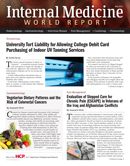Evidence for Discontinuing Proton Pump Inhibitors in Clostridium difficile Infection
Non evidence-based proton pump inhibitor use should be discontinued in the case of Clostridium difficile infection, according to findings published in JAMA Internal Medicine.

Patients with continuous proton pump inhibitor (PPI) use remained at elevated risk of Clostridium difficile infection (CDI) recurrence and should be discontinued, according to research published in JAMA Internal Medicine.
Researchers from various health centers in Canada conducted a retrospective cohort study of incident health care associated CDI cases in order to determine whether PPI use was associated with a risk of initial CDI recurrence. Additionally, the researchers aimed to examine what proportion of patients who developed CDI were taking a PPI for non-evidence based indication and whether physicians discontinued unnecessary PPIs in the context of CDI.
The researchers studied the association between PPI and CDI recurrence within 90 days in 2 university-affiliated hospitals. The researchers included 754 patients who developed CDI related to health care between January 1, 2010 and January 30, 2013. The patients included in the analysis survived for a minimum of 15 days after their initial episode of nosocomial CDI.
The researchers observed 52 deaths without recurrence, 193 documented recurrences, and 509 survivors without documented recurrence within 90 days. Among the 193 patients who experienced a recurrence, there were 157 instances of recurrences between observation days 15 and 56. The researchers broke down the recurrences into categories as follows: 15 to 21 days (37 patients), 22 to 28 days (43 patients), 29 to 35 days (28 patients), 36 to 42 days (24 patients), 43 to 49 days (12 patients), 50 to 56 days (13 patients), and 57 to 90 days (36 patients).
There were some major differences between PPI users and non-users, in that PPI users were more likely to experience a CDI recurrence (28.8% vs. 20.6%) or to die (10.3% vs. 4.7%) within 15 to 90 days of the initial episode, the authors explained. Recurrence was not linked to factors such as age older than 75 years, continuous PPI use, length of stay, and vancomycin treatment of the initial episode.
About two-thirds of the patients were taking a PPI at CDI diagnosis, and of those, 191 underwent medical review — of those, 30 were causes and the remaining 161 were controls. From the 191 PPI users, 90 had an evidence based indication for therapy. The most common factor for evidence-based indication for PPI us was age older than 60 years with two other concurrent risk factors for peptic ulcer disease. PPI use was discontinued by only three of the 458 patients who were taking a PPI at CDI diagnosis.
“For more than half of the patients with incident CDI, we have shown that the indication for PPI use is not evidence-based and have demonstrated that their PPI could be safely discontinued,” the authors concluded. “The cost of PPI discontinuation is negligible, and tapering the PPI dosage before discontinuation may help to curb any complications such as symptoms of rebound hyperacidity. In the absence of a randomized clinical trial clearly demonstrating that ongoing non-indicated PPI use is safe, we suggest that the use of non evidence based PPIs should almost certainly be discontinued in the context of CDI.”
